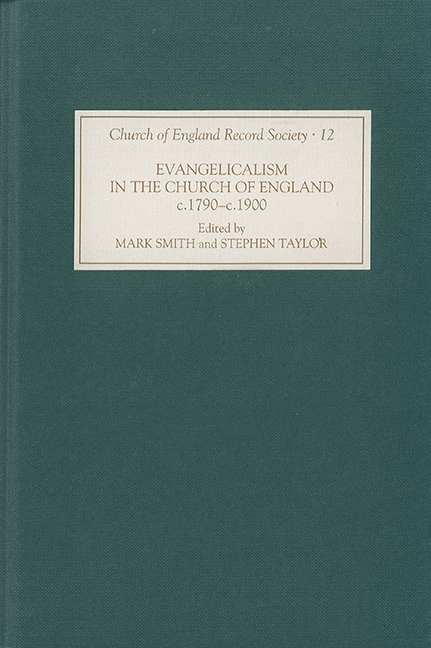Book contents
- Frontmatter
- Dedication
- Contents
- Preface
- Introduction
- 1 Hannah more and the Blagdon controversy 1799-1802
- 2 Henry Ryder: A charge delivered to the clergy of the diocese of Gloucester in the year 1816
- 3 The Undergraduate Diary of Francis Chavasse 1865-1868
- 4 J. C. Ryle: ‘First words’. An opening address delivered at the first Liverpool diocesan conference, 1881
- Index
- Miscellaneous Endmatter
2 - Henry Ryder: A charge delivered to the clergy of the diocese of Gloucester in the year 1816
Published online by Cambridge University Press: 31 August 2018
- Frontmatter
- Dedication
- Contents
- Preface
- Introduction
- 1 Hannah more and the Blagdon controversy 1799-1802
- 2 Henry Ryder: A charge delivered to the clergy of the diocese of Gloucester in the year 1816
- 3 The Undergraduate Diary of Francis Chavasse 1865-1868
- 4 J. C. Ryle: ‘First words’. An opening address delivered at the first Liverpool diocesan conference, 1881
- Index
- Miscellaneous Endmatter
Summary
Introduction
Life and Career
If they are to be measured by the conventional expectations of the early nineteenth century, in which personal connexions carried significant weight, then Henry Ryder's qualifications for appointment to the episcopal bench were more than adequate. He was born on 21 July 1777 the youngest son of Nathaniel, the first baron Harrowby of Sandon in Staffordshire and his wife Elizabeth, the daughter of Richard Terrick the bishop of London. His eldest brother, Dudley Ryder, from 1809 the first earl of Harrowby, although he suffered throughout his career from ill-health, was a distinguished statesman associated successively with Pitt, Addington, Perceval and Liverpool. He held a number of government positions, serving inter aliaas vice-president of the board of trade 1790-1801, foreign secretary 1804-5, ambassador to Berlin 1805-6, minister without portfolio 1809-12 and finally as lord president of the council throughout the administration of Lord Liverpool from 1812 to 1827 after which he declined an offer of the premiership. In addition to his ministerial responsibilities, Harrowby took considerable interest in the reform of the established Church, including the promotion of legislation to improve the position of curates which culminated, in 1813, in the successful passage of the Stipendiary Curates Act. He subsequently also served as a member of the Church Building Commission and as an Ecclesiastical Commisioner. Henry's middle brother, Richard, despite suffering even more seriously from debilitating illness, also achieved cabinet rank - serving, with some reluctance, as home secretary between 1809 and 1812 in the Perceval administration.
Henry Ryder was educated at Harrow and subsequently at St John's College, Cambridge, where he graduated M.A. in 1798. According to his obituary in the Christian observer, ‘he passed through the University with a generally high character as a young man of literary taste, studious habits and outwardly at least of irreproachable conduct’, though, ‘he was leading at this time, like other young men of rank and fashion, a life of worldly pleasure.’ In 1800 he was ordained by the bishop of Lichfield, James Cornwallis, to the curacy of Sandon, a living in the patronage of his own family. In 1801, he succeeded through the influence of Addington to the crown rectory of Lutterworth in Leicestershire and in the following year he married Sophia, the daughter of a local gentleman Thomas March Phillipps of Garendon Park.
- Type
- Chapter
- Information
- Evangelicalism in the Church of England c.1790–c.1890A Miscellany, pp. 51 - 108Publisher: Boydell & BrewerPrint publication year: 2004

